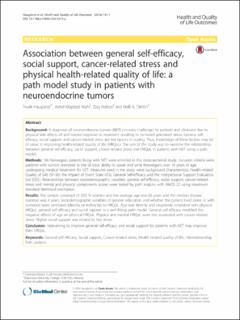| dc.contributor.author | Haugland, Trude | |
| dc.contributor.author | Wahl, Astrid Klopstad | |
| dc.contributor.author | Hofoss, Dag | |
| dc.contributor.author | DeVon, Holli A | |
| dc.date.accessioned | 2020-06-10T08:35:00Z | |
| dc.date.available | 2020-06-10T08:35:00Z | |
| dc.date.created | 2016-04-19T13:37:17Z | |
| dc.date.issued | 2016 | |
| dc.identifier.citation | Health and Quality of Life Outcomes. 2016, 14 . 1-7 | en_US |
| dc.identifier.issn | 1477-7525 | |
| dc.identifier.uri | https://hdl.handle.net/11250/2657470 | |
| dc.description.abstract | Background: A diagnosis of neuroendocrine tumors (NET) provides challenges to patients and clinicians due to physical side effects of and mental response to treatment resulting in increased perceived stress. General selfefficacy, social support and cancer-related stress are key factors in coping. Thus, knowledge of these factors may be of value in improving health-related quality of life (HRQoL). The aim of the study was to examine the relationships between general self-efficacy, social support, cancer-related stress and HRQoL in patients with NET using a path model.
Methods: 196 Norwegian patients living with NET were enrolled in this cross-sectional study. Inclusion criteria were: patients with tumors restricted to the GI tract; ability to speak and write Norwegian; over 18 years of age; undergoing medical treatment for NET. Measures used in the study were background characteristics, Health-related Quality of Life (SF-36), the Impact of Event Scale (IES), General Self-efficacy and the Interpersonal Support Evaluation List (ISEL). Relationships between sociodemographic variables, general self-efficacy, social support, cancer-related stress and mental and physical components scores were tested by path analysis with AMOS 22 using maximum standard likelihood estimation.
Results: The sample consisted of 50.5 % women and the average age was 65 years and the median disease duration was 4 years. Sociodemographic variables of gender, education and whether the patient lived alone or with someone were unrelated (directly or indirectly) to HRQoL. Age was directly and negatively correlated with physical HRQoL, general self-efficacy and social support in a well-fitting path model. General self-efficacy modified the negative effects of age on physical HRQoL. Physical and mental HRQoL were not associated with cancer-related stress. Higher social support was related to less stress.
Conclusion: Intervening to improve general self-efficacy and social support for patients with NET may improve their HRQoL | en_US |
| dc.language.iso | eng | en_US |
| dc.publisher | BioMed Central (BMC) | en_US |
| dc.subject | path analysis | en_US |
| dc.subject | interrelationship | en_US |
| dc.subject | health related quality of life | en_US |
| dc.subject | cancer-related stress | en_US |
| dc.subject | social support | en_US |
| dc.subject | general self-efficacy | en_US |
| dc.title | Association between general self-efficacy, social support, cancer-related stress and physical health-related quality of life: a path model study in patients with neuroendocrine tumors | en_US |
| dc.type | Peer reviewed | en_US |
| dc.type | Journal article | en_US |
| dc.description.version | publishedVersion | en_US |
| dc.rights.holder | Open Access | en_US |
| dc.source.pagenumber | 7 | en_US |
| dc.source.volume | 14 | en_US |
| dc.source.journal | Health and Quality of Life Outcomes | en_US |
| dc.identifier.doi | 10.1186/s12955-016-0413-y | |
| dc.identifier.cristin | 1351260 | |
| cristin.ispublished | true | |
| cristin.fulltext | original | |
| cristin.qualitycode | 1 | |
